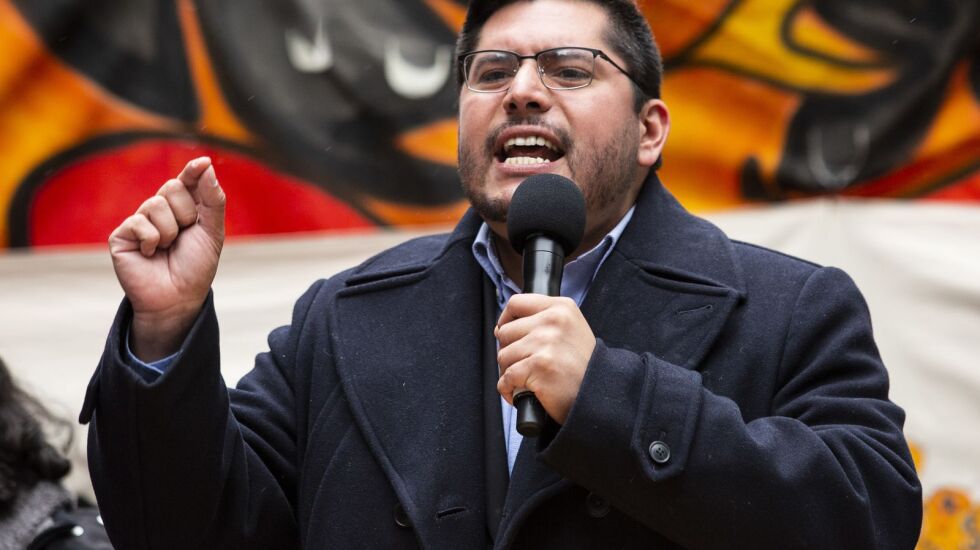Fed up with what he called the “revolving door” at the state’s attorney’s office, a Northwest Side City Council member persuaded his colleagues on Wednesday to levy hefty fines and impose jail time against anyone caught illegally possessing a firearm in Chicago.
The ordinance sponsored by Ald. Anthony Napolitano (41st) — and approved over strenuous objections from civil rights attorneys — empowers Chicago police officers to issue “administrative notices of violation” for the crime of illegal gun possession.
First-time offenders face a $5,000 fine and up to 90 days in jail. A second offense would carry a fine of up to $20,000 and 180 days in jail.
“We have over 630 homicides by guns. We have over 3,252 people shot in 2022. We need some teeth in this game as the city of Chicago. We can’t have our state’s attorney dumping all charges with this revolving-door effect. We can’t do it anymore,” Napolitano said.
“In the last two years, how many repeat offenders have we seen that were gun-toting offenders back on the streets in no time, or on ankle monitors, committing crimes again?” he added. “We’re not prosecuting anybody.”
Such notices normally are reserved for quality-of-life offenses. Napolitano denied his ordinance casts too broad a net and risks snaring Chicagoans who carry guns because they’re afraid of crime.
“Get an FOID card and get a concealed carry card. And then, you can carry a gun like everybody else,” he said.
Ald. Carlos Ramirez-Rosa (35th) handed Council members a letter from 27 legal groups objecting to the ordinance. He argued the ordinance will not make Chicago safer, and in fact, could “lead to even more violence.”
Napolitano and the administration are engaging in “just more tough-on-crime posturing,” Ramirez Rosa added.
“They want to act like they’re doing something to address gun violence when, in reality, they’re wasting limited city resources,” Ramirez-Rosa said. “I need the Law Department to focus on problem buildings. I need them to focus on building code violations. I need them to focus on litigation impacting the city. I don’t need them going after people already facing steeper fines in the criminal courts to get an additional fine that likely will never be paid because the individual doesn’t have money.”

Ramirez-Rosa argued State’s Attorney Kim Foxx “charged a record number of people” with gun offenses last year.
“But if the state’s attorney determines there’s insufficient evidence and the city then decides to go after them anyway with these fines, that could potentially further lead to mistrust with the criminal justice system,” Ramirez-Rosa said.
Napolitano is a former Chicago Police officer and Chicago firefighter whose ward is home to scores of officers, whose issues he has championed in the Council.
On Wednesday, he used a parliamentary maneuver to force consideration of his ordinance, deferred in November, and pass it without debate, using a roll call from earlier in the meeting.
By the time Ramirez-Rosa realized what was happening, it was too late to stop.
When Ramirez-Rosa rose to object, Mayor Lori Lightfoot ruled him out of order. That was followed by a verbal argument, and a roll call vote that Lightfoot easily won.
Ramirez-Rosa called it just the latest example of Lightfoot trampling Council rules.
“The point of Roberts Rules of Order is not to steamroll members of a legislative body. It’s to foster a democratic discussion,” he said.
The letter signed by the ACLU of Illinois, the Cook County Public Defender, the Chicago Council of Lawyers and a host of other legal and civil rights groups makes the argument that the “vast majority” of people accused of possessing a gun without a license are “already poor and live in low-income communities of color.”
They’re primarily African American men, ages 18-24.
“Most of them do not have the resources to pay fines such as those that could be imposed under the ordinance,” and a court-ordered judgment “would produce an enormous burden on the poorest families in our city,” the letter states.
“Many of the people ordered to pay fines would be parents, whose wages or other income could be garnished and sent to the city instead of providing for their children. The end result of a fine-focused policy will be a two-tiered stem: one path for people with the means to pay their fines and move forward and another for people who cannot afford to pay their fines — who will forever carry this debt.”







